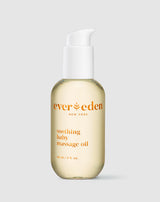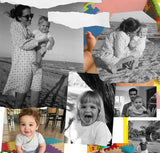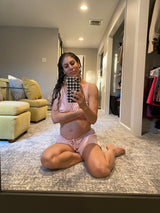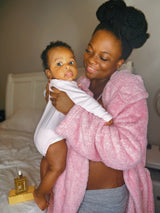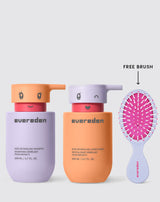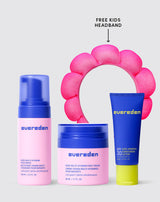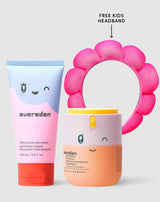Most people aren’t surprised when a married couple conceives a child. But when the married couple consists of two men, the news spreads. That’s how Trystan Reese, a trans man who became pregnant with his third child, along with his husband, Biff Chaplow, found themselves making headlines and growing a social media following after being featured on WNYC’s parenting podcast, The Longest Shortest Time.
In addition to consulting, training, and speaking to companies and organizations about trans issues, Trystan is Director of Family Formation at the Family Equality Council and sits on the board of directors at the Transgender Law Center. The father of three—two adopted (Hailey and Lucas), one biological (Leo)—shares his family life on @biffandi, the growing community that he’s built on Instagram.
We recently spoke with the Portland, Oregon-based activist and father about starting a family, the ups and downs of pregnancy, and how all families can get involved with advocating for trans rights.
Let’s talk about your beautiful family of three kids. It started with adoption. How did you and your husband, Biff, know that you were ready to become dads?
I don't think that I was ready. What happened was, we got a call about our then-niece and nephew, these two little ones who needed emergency family placement. My partner and I knew that they needed a place that was safe for them, and where they would be loved and supported. We knew that even though we weren't ready—or at least we weren’t really thinking about permanent parenthood—we knew that we could show up for these two kids. That’s just how I was raised: When kids need you, you show up for them, even if that means making huge sacrifices.
We realized that we really were the best and only option for them, compared to going back home to where they'd come from. We had to file for emergency guardianship so that we could take them to the doctor if they got sick and enroll them in school. After we filed the paperwork, there was an investigation and a judge for the case. Everyone agreed that we were the best option for them, and then we got permanent guardianship. It was just a series of small steps centered on making decisions based on what they needed and where they would be safest.
Piece by piece, it came together. In 2015, we were able to become their forever family—a done deal.
The two of you had a very unique journey to parenthood. What were you unprepared for as parents?
Because it was a unique situation, I was just completely unprepared for the level of trauma that they had experienced and the amount of support that would be required.
Tell us about the decision to have another child.
We made it really clear to the kids that we wanted to bring another child into our family, that we wanted to create a child. We kept them in the loop, but we didn’t tell them that we were actually going to have a baby, for real, until I was in my second trimester. That’s when we sat them down and we had sparkling apple cider. We announced it to them as if it were a big thing for us to celebrate!
Love the image of bringing out the champagne glasses.
Yes, we got the fancy glasses, and the kids didn’t even notice until my daughter, Hailey, was like, “Wait a minute—what are we celebrating?” So, I said, “Well, you know that Dad and I have been wanting to get pregnant and have a baby and give you guys a little baby sibling. Well, it's happening, and I’m pregnant!”
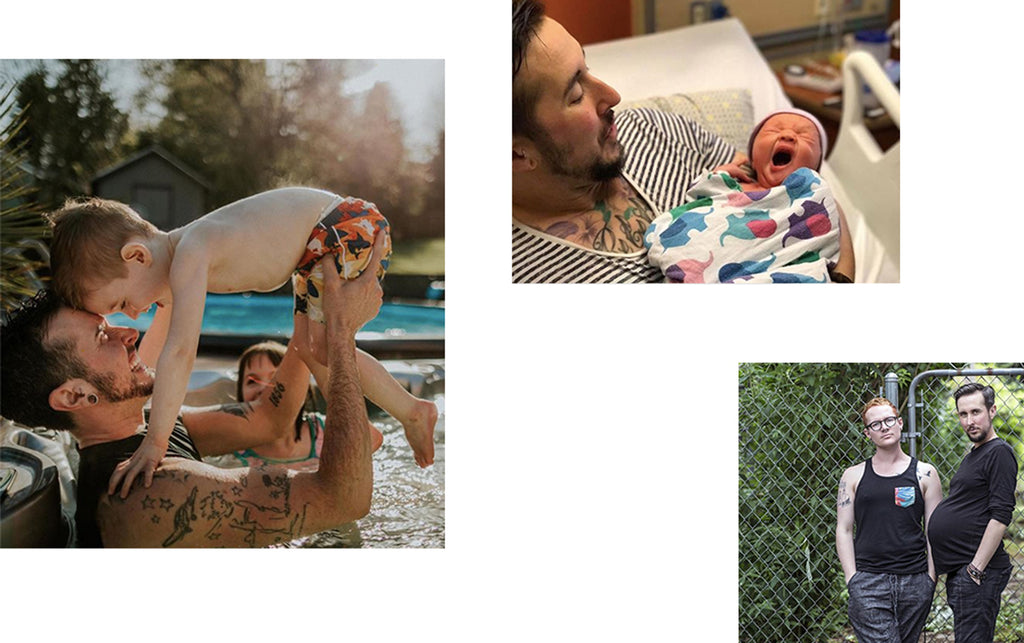
Tell us about your pregnancy experience.
My joke with my medical team was that I wanted to be the most boring pregnancy they'd ever supported, and they thought that was funny because I'm a man, so there is something inherently not boring about that.
I’m really lucky. I did have some morning sickness in the first trimester, but it was gone by the second trimester. I had no preeclampsia, no hypertension, no gestational diabetes. I had no other complications—it was very straightforward. The only complication was that over the final two weeks, the fetus was really large, and I had rib separation. That was extraordinarily painful, as my ribs splintered from my sternum. Luckily, it’s cartilage, which is malleable, so while it was painful, it healed.
Did you change your lifestyle in any way to help with your smooth pregnancy?
Yes and no. I really wanted to make sure that I was moving my body. I went to prenatal yoga, which is one of the few things that is evidence-based for correlation to an easier labor and delivery process. I was scared to go somewhere that was all women, because I didn’t want them to feel like I was encroaching upon the sacred space for them.
I checked in with the teacher ahead of time, sent her an email, and explained my situation. I let her know that if it was a safe space for women only, that was completely okay, but if I were welcomed, I would really love to come. I love that she wrote me back and said, “You’re welcome to come. This is a great opportunity for me to examine my own practice and think about how I can be using more gender-inclusive language in my work.”
I also had as many weird cravings as anyone else, and I just tried to consider what my body needed in terms of nutrition, based on the craving. If I craved sour things, I would drink orange juice, eat fruit, or drink lemonade instead of eating sour candy. And then, sometimes I had French fries because I wanted French fries. It was a mix of just giving into myself and then trying to hack my body’s desire for unhealthy things for candy.
It’s impossible to go without French fries. You’ve described your post-pregnancy mental state as postpartum elation. How did it feel after giving birth?
I feel extremely lucky that I had a lot of mental health support and psychological support throughout my pregnancy. I went through Kaiser Permanente, and they have a team of full-time therapists and counselors on staff, specifically to work with people who are pregnant and in the postpartum period. I had an incredible therapist there who helped me through the whole process. She really prepared me to think about what issues can happen during the perinatal process, including mood issues. So, I was really prepared for anxiety and depression. What I wasn’t prepared for was that I felt the opposite after he was born.
They call it the fourth trimester for a reason. I felt so connected to him. It felt so natural and easy to take care of him, which I had just not expected at all. I don't really like babies, so I sort of expected that I would hand him off to Biff, who loves babies, and then kind of metaphorically take him back when he starts talking. But that’s not what happened at all! Leo would move in a certain way and I knew exactly what he wanted or needed. There was a connection there that was really special, and I was just happy to be there with him.
@biffandi is such a wonderful platform. How do you set boundaries around sharing your parenting lifestyle online? This is an issue that many parents grapple with nowadays, regardless of the size of their following.
We initially did not want to share anything about our pregnancy story. We know several dozen transgender men who’ve given birth, and we know that transphobia is as present today as it has ever been. We knew that there are voices out there that could drown out any positive message that we wanted to send. Initially, we were going to be very secretive about the process. But halfway through the pregnancy, we had an awakening, where we had an opportunity to tell a different kind of trans story—one that was rooted in family and love and celebration and resilience and community, and not in tragedy, which is how people often want our stories to go.
We felt that it was our responsibility because of the privileges that we have to tell our story publicly. We felt that we should take that backlash because we are better suited to handle it than other trans people who may have much more difficult lives than we do. We hoped that if we took some of the backlash, then it won’t be there for others. That’s 100 percent about whiteness—it was 100 percent about us being white people with white privilege, which protects us from a lot of the worst of transphobia because the intersection of racism, anti-blackness, and transphobia is particularly toxic.
We had no idea it was going to blow up the way that it did. I'm extremely conscious about what stories I share, and how much of my kids and my life I put online. I do share a lot, but everything that I share is very intentional and rooted in what sort of change the story could inspire.
Thank you so much for this thoughtful explanation and look into your Instagram! Sometimes, you talk about skin care on your platform. Why is skin care important to you?
Having a skincare routine is my small way of taking care of myself and showing love for my body every single day. That's also a really concrete way that I'm modeling to my kids, that loving yourself is important.
We actually do spa night at our house. Once a month, I take out all the essential oils and the kids get to pick their scents. I make a little sea salt scrub, and we do a little foot soak. As a kid, you're not really taught to be in your body. You're not really taught to just be present and to love yourself and to be connected to what feels good, which can just be rubbing your own feet.
Tell us about your work as Director of Family Formation at Family Equality Council, and how families can get involved.
There are so many realms in parenthood where trans people, LGBTQ+ people, and people of color are uniquely impacted. Incarceration is a huge one. LGBTQ+ people are much more likely to be arrested and criminalized for actions that are people are not. They are more likely to be sentenced harsher, and they are more likely to spend time in solitary confinement. We know that prisons have an overrepresentation of folx of color, specifically Black people. I recommend becoming a penpal to someone in prison, to bring a human connection to someone who is incarcerated. And you can do that through Family Equality. They'll find you a pen pal and they'll tell you all about that person. You can write to their P.O. Box, and you don’t have to use your home address.
Another really practical thing that parents can do is talk with your kids about families that do not look like yours. Read books with diversity. We know that homophobia and racism start at home. Parents can interrupt these systems and break these cycles. Even if you don’t think you’re an expert on these issues, guess what? Your kids don’t need you to be an expert—they just need you to bring in new stories.
Thank you so much for these starting tips! What does Eden mean to you?
When I was pregnant, I studied HypnoBirthing so that I could really master the response to my body’s experience of pain during the labor process. Your brain is wired to process pain as dangerous, and so I spent the whole nine months of my pregnancy working on that connection and putting myself in that place that feels the most peaceful to me.
For me, it’s this: Every summer, my extended family and I all go to a family retreat on Orcas Island off the coast of Seattle. There are crashing waves and cliffs, and sometimes you can see whales in the distance, and there is a bench in the forest on a cliff looking over the ocean. During HypnoBirthing, I tried to access that place. I’m sitting on a bench in July, and there’s a pathway down to the beach where the kids play.


